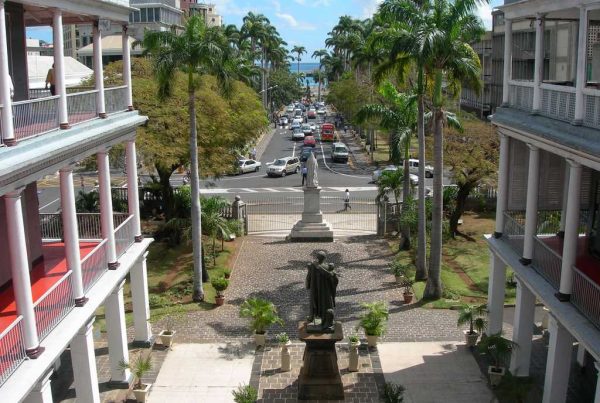Mauritius, a small island developing state, has demonstrated considerable economic resilience and innovation over the years, transitioning from a mono-crop sugar economy to a diversified one that includes tourism, finance, and information technology. However, like many economies around the world, Mauritius faces its unique set of challenges, including those posed by global economic uncertainties, climate change, and the need for sustainable development. The Bank of Mauritius, as the central bank of the country, plays a pivotal role in navigating these challenges through its monetary policy.
Economic Context of Mauritius
As of the last update, Mauritius was navigating through the economic repercussions of the COVID-19 pandemic, alongside global economic pressures such as inflationary trends and supply chain disruptions. The country’s economy is heavily reliant on tourism, which was severely impacted by travel restrictions. Additionally, Mauritius has been dealing with fluctuations in global sugar and textile markets, affecting its traditional sectors.
The Role of the Bank of Mauritius
The Bank of Mauritius is tasked with maintaining price stability and promoting a stable and sound financial system. To achieve these objectives, the Bank employs various monetary policy tools, including interest rate adjustments, reserve requirements, and open market operations. The appropriateness of the Bank’s monetary policy can be evaluated in the context of its goals:
1. Combatting Inflation
With global inflationary pressures affecting economies worldwide, the Bank of Mauritius has to balance its monetary policy to combat inflation without stifling economic growth. Adjusting the Key Repo Rate (KRR) is a primary tool in this regard. By fine-tuning interest rates, the Bank can influence inflation expectations and spending behaviors, thus stabilizing the currency and maintaining the purchasing power of the Mauritian rupee.
2. Supporting Economic Recovery
Post-pandemic, supporting economic recovery has been paramount. The Bank of Mauritius has likely employed accommodative monetary policies to stimulate economic activity. This could involve keeping interest rates low to encourage borrowing and investment, especially in sectors like tourism, which are vital for the country’s recovery.
3. Financial Stability
Ensuring the stability of the financial system is crucial, particularly in small economies where shocks can have magnified effects. The Bank of Mauritius monitors the health of the banking sector and the broader financial market, ready to intervene with measures such as liquidity support to prevent systemic risks.
4. Exchange Rate Policy
Given Mauritius’ reliance on imports and the importance of tourism and exports, managing the exchange rate through monetary policy is crucial to maintaining competitiveness. The Bank’s interventions in the foreign exchange market aim to prevent excessive volatility, supporting stable economic conditions.
Why the Policy is Right for the Current Context
The current monetary policy of the Bank of Mauritius is deemed appropriate for several reasons:
Proactive and Responsive: The Bank has shown agility in responding to global and domestic economic changes, adjusting its policy tools as needed to maintain economic stability.
The Bank of Mauritius has demonstrated an acute awareness of global economic trends and their potential impact on the Mauritian economy. This includes monitoring global financial markets, commodity prices, and major economic indicators from key trading partners and international financial institutions. By anticipating the effects of global shifts, such as the recent inflationary pressures triggered by supply chain disruptions and increased commodity prices, the Bank has been able to preemptively adjust its monetary policy stance. For instance, recognizing the potential for imported inflation, the Bank might adjust interest rates or reserve requirements to temper domestic price increases without curtailing growth.
Adaptive Policy Measures
A cornerstone of the Bank’s proactive stance is its readiness to employ a wide range of policy measures tailored to the evolving economic landscape. This includes:
– Interest Rate Adjustments: The Key Repo Rate (KRR) has been adjusted in a timely manner to balance the goals of controlling inflation and supporting economic activity. Lowering the KRR during economic downturns to stimulate borrowing and investment, and raising it when inflationary pressures mount, exemplifies this balanced approach.
– Liquidity Management: The Bank has adeptly managed liquidity in the financial system, ensuring that banks have the necessary resources to lend to businesses and individuals. This has been particularly important during periods of economic stress, such as the COVID-19 pandemic, where enhanced liquidity was essential for economic resilience.
– Currency Interventions: To prevent excessive exchange rate volatility that could harm the competitiveness of Mauritius’ export and tourism sectors, the Bank has occasionally intervened in the foreign exchange market. These interventions are carefully calibrated to ensure they support, rather than distort, market dynamics.
Engagement with Stakeholders
The Bank’s proactive and responsive approach extends beyond its technical monetary policy measures. It has also involved active engagement with financial institutions, businesses, and international partners. This engagement helps the Bank to gather real-time insights into the economic climate, allowing for more informed decision-making. Moreover, by communicating its policy actions and intentions clearly, the Bank has fostered a climate of predictability and confidence among investors and the public.
Forward-Looking Strategies
The Bank of Mauritius not only reacts to immediate economic challenges but also plans for future ones. This involves developing forward-looking strategies that take into account long-term trends, such as technological advancements, climate change, and shifts in global trade patterns. By doing so, the Bank ensures that its monetary policy framework remains robust, flexible, and capable of supporting sustainable economic growth over the long term.
The proactive and responsive nature of the Bank of Mauritius’s monetary policy is a testament to its commitment to economic stability. Through a combination of anticipating global economic shifts, implementing adaptive policy measures, engaging with stakeholders, and developing forward-looking strategies, the Bank has effectively navigated the complex and ever-changing economic landscape. This approach has not only mitigated the impacts of economic shocks but has also laid a foundation for sustained economic growth and development in Mauritius.
Balanced Approach: By striking a balance between fighting inflation and supporting growth, the policy ensures that short-term measures do not compromise long-term economic health.
Expanding on the sub-section titled “Balanced Approach: By striking a balance between fighting inflation and supporting growth, the policy ensures that short-term measures do not compromise long-term economic health” involves delving deeper into how the Bank of Mauritius navigates the fine line between curbing inflation and fostering economic growth, without jeopardizing the long-term health of the economy. This approach is crucial, especially for an economy like Mauritius’, which is highly diversified and externally oriented, making it susceptible to global economic shifts and shocks.
Understanding the Balancing Act
The balancing act that the Bank of Mauritius performs through its monetary policy is a testament to its nuanced understanding of the Mauritian economy’s dynamics. This delicate balance is critical for several reasons:
Inflation Control without Stifling Growth
Inflation, if left unchecked, can erode purchasing power, reduce real income, and discourage investment. However, aggressively combating inflation through high-interest rates can suppress economic growth by making borrowing more expensive for businesses and consumers. The Bank of Mauritius employs a judicious approach to adjusting the Key Repo Rate (KRR), ensuring that it deters inflation without deterring investment and consumption, which are vital for growth.
Promoting Sustainable Economic Activity
The central bank supports sectors that are key to Mauritius’ economic diversification strategy, such as tourism, finance, and technology. By maintaining a supportive monetary environment, the bank facilitates investment in these sectors, promoting sustainable economic activities that contribute to long-term growth.
Dynamic Policy Adjustments
The Bank of Mauritius’s policy framework allows for dynamic adjustments based on evolving economic indicators and forecasts. This flexibility ensures that the bank can respond proactively to both domestic and international economic developments, adjusting its stance as necessary to support growth or tighten inflation control.
Mechanisms Employed
The Bank of Mauritius employs several mechanisms to achieve this balance:
– Interest Rate Policy: By carefully setting the KRR, the bank influences the cost of borrowing. A lower rate encourages borrowing and spending, stimulating economic activity, whereas a higher rate can help cool down inflationary pressures.
– Liquidity Management: Through open market operations, the bank manages the liquidity in the banking system, ensuring that there is enough money supply to support economic activity without fueling inflation.
– Communication and Guidance: The bank uses forward guidance to communicate its monetary policy stance and intentions, helping to set expectations among investors, businesses, and consumers, thereby stabilizing the economic outlook.
Impact and Outcomes
The balanced approach of the Bank of Mauritius has several positive outcomes:
– Economic Stability: It promotes a stable economic environment conducive to investment and long-term planning by businesses and consumers.
– Confidence among Stakeholders: By demonstrating a commitment to both growth and stability, the bank builds confidence among domestic and international investors, as well as within the local business community.
– Resilience to Shocks: This approach also builds resilience into the Mauritian economy, enabling it to better absorb and recover from external shocks, whether they are financial, environmental, or health-related.
The balanced monetary policy approach of the Bank of Mauritius exemplifies the central bank’s strategic role in fostering a stable yet dynamic economic environment. Through careful calibration of its policy tools, the bank ensures that short-term measures to combat inflation or stimulate growth do not come at the expense of the long-term economic health of Mauritius. This nuanced approach not only supports immediate economic recovery and stability but also lays a solid foundation for sustainable growth and development.
Safeguarding Financial Stability: Through vigilant oversight and regulation, the Bank has maintained the resilience of the financial sector, a cornerstone for economic confidence and growth.
Safeguarding Financial Stability: Detailed Exploration
The role of the Bank of Mauritius in safeguarding financial stability cannot be overstated, especially given the increasing complexity of the global financial system and the interconnectedness of economies. Financial stability, essentially, means maintaining a state where the financial system – encompassing banks, financial markets, and the broader financial infrastructure – is resistant to economic shocks and is capable of efficiently allocating resources, managing risks, and maintaining continuous operations even under adverse conditions. This stability is crucial for fostering economic confidence and growth, as it ensures that both consumers and businesses can make financial decisions with confidence, leading to sustainable economic development.
Vigilant Oversight
The Bank of Mauritius employs vigilant oversight to monitor the health and resilience of the financial sector. This involves regular assessment of financial institutions, especially banks, to ensure they have adequate capital buffers and liquidity to withstand economic downturns. By implementing strict regulatory standards and conducting stress tests, the Bank can identify vulnerabilities within the financial system early and take preemptive action to mitigate potential risks.
The oversight extends to non-bank financial institutions, which have become increasingly significant in the financial ecosystem. Ensuring that these entities also adhere to stringent regulatory standards helps in preventing systemic risks that could arise from less regulated corners of the financial system.
Comprehensive Regulation
Regulation is another cornerstone of the Bank of Mauritius’ strategy to maintain financial stability. This includes setting and enforcing rules that govern the operation of financial institutions, such as capital requirements, risk management practices, and consumer protection norms. By requiring institutions to maintain a certain level of capital and to manage their risks effectively, the Bank ensures that they remain solvent and stable, even in challenging economic times.
Consumer protection norms are equally important, as they help in maintaining trust in the financial system. These regulations protect consumers from fraudulent practices and ensure they are treated fairly by financial institutions, thereby maintaining confidence in the financial system.
Crisis Management and Resolution Frameworks
The Bank of Mauritius also has frameworks in place for managing financial crises and resolving financial institutions in distress. This includes mechanisms for providing liquidity support to banks under stress, thereby preventing temporary problems from escalating into systemic crises. Additionally, the Bank has established resolution frameworks that allow for the orderly wind-down of failing institutions without causing widespread panic or systemic risk.
Continuous Adaptation to Global Trends
In an era marked by rapid technological advancements and evolving global financial landscapes, the Bank of Mauritius’ approach to financial stability is not static. It continuously adapts its regulatory and oversight frameworks to address emerging challenges such as cyber risks, fintech innovations, and cross-border financial flows. By staying ahead of these trends, the Bank ensures that the financial system remains robust and capable of supporting the country’s economic objectives.
Through vigilant oversight, comprehensive regulation, effective crisis management, and adaptation to global financial trends, the Bank of Mauritius plays a critical role in safeguarding financial stability. This stability is a cornerstone for economic confidence and growth, ensuring that Mauritius’ financial system remains a pillar of strength and resilience in the face of both domestic and international challenges. By maintaining a stable and reliable financial sector, the Bank of Mauritius facilitates sustainable economic development and reinforces the country’s position in the global economy.
Alignment with Development Goals: The monetary policy also aligns with Mauritius’ broader development goals, including sustainable development and economic diversification.
Expanding on the sub-section “Alignment with Development Goals” involves delving deeper into how the monetary policy of the Bank of Mauritius supports the nation’s broader development goals, particularly sustainable development and economic diversification. These goals are crucial for Mauritius, as they aim not only for economic resilience and growth but also for the long-term sustainability of its development trajectory.
Alignment with Development Goals
Mauritius has embarked on a journey towards achieving sustainable development and economic diversification to ensure the long-term resilience and prosperity of its economy. The monetary policy of the Bank of Mauritius plays a significant role in supporting these objectives through various channels:
Supporting Sustainable Development
– Green Financing Initiatives: Recognizing the importance of environmental sustainability, the Bank of Mauritius has been encouraging green financing initiatives. These initiatives involve providing financial incentives or lower interest rates for projects focused on renewable energy, waste management, and other environmental sustainability projects. By doing so, the monetary policy supports investments that are critical to Mauritius’ sustainable development goals.
– Climate Risk Management: The Bank of Mauritius integrates climate risk considerations into its monetary policy framework. This involves assessing how climate-related risks can impact the financial sector and the broader economy and adjusting monetary policy accordingly to mitigate these risks. This proactive approach ensures that the financial system remains resilient in the face of climate change, aligning with the country’s commitment to sustainable development.
Promoting Economic Diversification
– Facilitating Access to Credit: One of the key aspects of Mauritius’ economic diversification strategy is to develop high-potential sectors such as information technology, ocean economy, and financial services. The Bank of Mauritius facilitates this by ensuring that the monetary policy environment is conducive to easy access to credit for businesses in these sectors. Lower interest rates and targeted lending programs can help emerging industries flourish, reducing the country’s reliance on traditional sectors.
– Strengthening the Financial Sector: A robust financial sector is crucial for economic diversification. By maintaining a stable and sound financial system, the Bank of Mauritius ensures that businesses across all sectors have the confidence to invest, innovate, and expand. The central bank’s efforts to enhance financial inclusion also play a crucial role in this regard, ensuring that small and medium-sized enterprises (SMEs), which are often key drivers of diversification, have access to the financial services they need to grow.
– Enhancing Competitiveness: A competitive exchange rate policy ensures that Mauritius remains an attractive destination for investment and tourism, two critical components of the economy that the country is looking to diversify further. By carefully managing the exchange rate, the Bank of Mauritius helps maintain the competitiveness of Mauritius’ export and tourism sectors, thereby supporting economic diversification.
The monetary policy of the Bank of Mauritius is intricately linked to the broader development goals of the country. Through measures aimed at supporting sustainable development and promoting economic diversification, the central bank not only addresses immediate economic challenges but also lays the foundation for long-term resilience and growth. This strategic alignment ensures that monetary policy is not just about maintaining financial stability and controlling inflation but also about contributing to a sustainable and diversified economic future for Mauritius.
The monetary policy followed by the Bank of Mauritius is crafted to navigate the complex and evolving economic landscape. It reflects a deep understanding of the local and global economic context, demonstrating a commitment to achieving macroeconomic stability and fostering sustainable economic growth. As Mauritius continues to adapt to post-pandemic realities and global economic shifts, the central bank’s policy approach will remain pivotal in steering the country towards a prosperous future.





